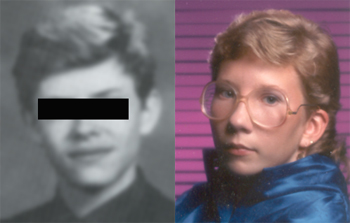In 1980, my fourth-grade class held a mock election to learn about the electoral process. We cast votes by secret ballot, and since my mom was strongly against the staunch conservative Ronald Reagan, I cast my vote for the more liberal Jimmy Carter. When the teacher read the results, they were astounding: one vote for Carter, the rest for Reagan. "Reagan won," he announced, "by a landslide." I sunk down in my desk, as nonchallantly as possible.
There were rumblings at lunchtime. "Who voted for Carter?" my classmates demanded, their voices rising as they hoisted invisible pitchforks. "Burn him! Burn him!" Suspicion fell on the class scapegoat, a skinny, shy boy who wore ill-fitting hand-me-downs and was rumored to pick his nose, put it on the bottom of his shoe, and then eat it later. A disgusting habit that, in retrospect, he probably never performed.
Nor did he vote for Carter. I was in a unique position to know this, but I said nothing, pretending to be engrossed by my milk carton. As several boys dragged him away to his recess punishment, I heard the class scapegoat insisting, "But I voted for Reagan!"
Lessons about the electoral process, indeed.
As the class scapegoat returned from recess, disheveled and bewildered, I resisted the impulse to give his shoulder a sympathetic pat. Everyone knew that associating with the class scapegoat was social death. I thought, guiltily, about Sunday School lessons where we'd been urged to stand up for weaker students. Faced with the choice of sitting at a table full of popular kids or putting our trays next to the loner, we were supposed to sit with the loner. The people who wrote those lessons obviously didn't go to my school.
In high school, as I grew from a chubby bookworm into a self-assured yearbook co-editor, the scapegoat grew a curtain of hair to hide behind. He never hit a growth spurt, and with his delicate features and shy giggle — plus his professed adoration of the androgynous musician Prince — he still attracted the wrong kind of attention. By our senior year, things had turned around for him, as he demonstrated a talent in art and found solace amongst a fiercely protective group of fellow artists, most of them girls not much bigger than him. On his way to the Art Room each day, though, he walked a gauntlet of taunts and abuse.
While I went away to college, the scapegoat stayed in the hometown where he'd been tormented. Why he stayed I couldn't fathom, except that he probably lacked the funds to attend college. After grad school, I returned to take a job in the hometown newspaper. One day, I ran into him in the Wal-Mart parking lot with two blonde toddlers. He seemed blithely happy: things were good, he told me breathily.
Maybe they were, that day, but only a few months later, I was checking the reports at the district justice office, a weekly chore. Opening a manila folder, I spotted the scapegoat's name and read the police report. He'd been cited for child neglect. Apparently, one of his toddlers was spotted wandering down the street, wearing nothing but a diaper, while he slept on the couch. When another classmate who worked at the newspaper read the item I published in the police log, she snickered. "Well, what did you expect? He was always a loser." This said without a hint of irony at the fact that she still had big hair and wore tapered pants.
In the wee hours of our 15th class reunion, I saw a frail blonde guy wobbling near the bar. He had a wide smile, reminding me of William DeFoe. Was that...? It couldn't be. Yes, the scapegoat, standing alone, looking lost.
I strode over to him, said his name. "So what have you been doing?" I asked.
Seeing me, his grin got even broader. "I'm working at a truck cap company."
"That's great," I said. The factory jobs in our area were the best-paying jobs for high school graduates without a higher degree.
"It's a living," he said. "What are you up to?"
I told him about my work as a transcriber and about editing my literary magazine. He said that sounded exciting.
As we talked, I wondered: would he smile so broadly if he knew how many times I'd failed him? Would he smile if he knew how many times I'd said nothing as bullies rolled up their sleeves and headed for him? Would he smile if he knew that, awkward book nerd that I was, I cared more about self-preservation? Again and again, I had let him take the fall. But I did not tell him these things. Instead, I gave him my business card, told him to e-mail me. Shortly afterwards, he drifted away into the night, maybe to sketch his impressions of the reunion while listening to Prince.
So now, for his sake, let me say what I should have said 29 years ago. To my fourth grade classmates, should you read this, I'm the one who voted for Carter. Come and get me.
This piece was inspired by fragments that appeared in two earlier
entries, A Day of
Mourning, and Catching
Up.


